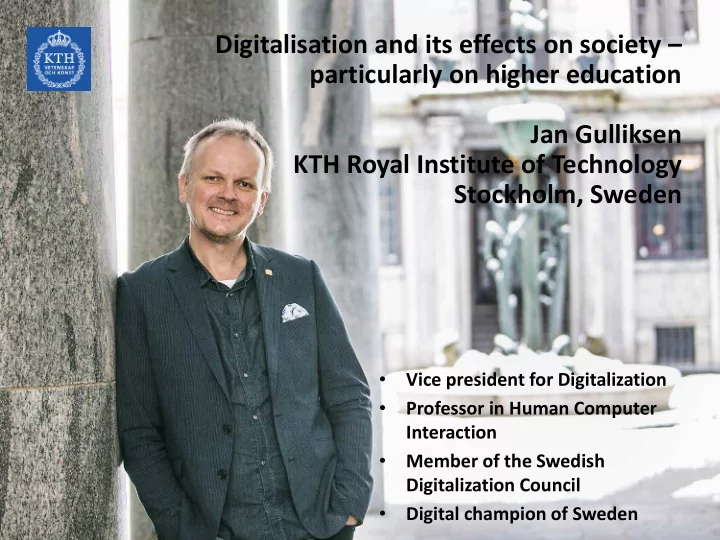

Digitalisation and its effects on society – particularly on higher education Jan Gulliksen KTH Royal Institute of Technology Stockholm, Sweden Vice president for Digitalization • Professor in Human Computer • Interaction Member of the Swedish • Digitalization Council Digital champion of Sweden •
Traditional office environments 20 years of development – Do you see the development?
Two types of digitalization Information digitalization (English: digitization) a process in which information is transformed from analogue to digital, making the information structurable, searchable and accessible through the digital channels. Social digitization (English: digitalization) is the change of society, working life, business, technology use and the new business conditions that arise from the opportunities offered by the technology. Digital technology allows us to do things in completely different ways than we could before, but it also gives us the opportunity to do brand new things.. ”The social and human-revolving process that gradually becomes increasingly difficult to distinguish at all from any part of life. This means that individuals and organizations can communicate and exchange information with other people, organizations and their environment in new ways. Digitalization and the use of ICT-based solutions can help to increase the accessibility and efficiency of both the business and public administration.” (SOU 2014:13, SOU 2015:91)
150 years of digitalization of the music industry
Digitalization – digital transformation
Digitalization of education 20 years of development – Do you see the development?
2014-04-05 7
The future pedagogy
Blooms taxonomy and Flipped Classroom Traditional Flipped classrooms classrooms Creating Evaluating Analyzing Applying Understanding Remembering
The Swedish digitalization strategy Vision: A sustainable digital Sweden. General goal: Sweden shall be the best country in the world when it comes to using the opportunities for digitalization Sub goals: digital competence, • digital security, • digital innovation, • digital leadership and • digital infrastructure. • The Governments overarching goals: Sweden shall have Europe’s lowest unimployment 2020 http://www.regeringen.se/49adea/contentassets/5429e024be6847fc907b786ab954228f/digitaliseringsstrategin_slutlig_170518-2.pdf
What will the future labour market look like? Digitalization Automatization Robotization Globalization Urbanization Individualization Fölster, S. (2014). Vartannat jobb automatiseras inom 20 år – utmaningar för Sverige.
Nearly half of US jobs could be at risk of computerization Creative and social intelligence skills are required “The future of employment: how susceptible are jobs to computerisation?” by Carl Benedikt Frey and Michael A. Osborne, September 17, 2013
The job context of the ”hour-glass economy” For every 10 middle-skilled jobs that disappeared between 1996-2008 in: UK: 4.5 replacement jobs were high-skilled and 5.5 low-skilled Ireland: 8 replacement jobs were high-skilled and 2 low-skilled France: 7 replacement jobs were high-skilled and 3 low-skilled Germany: 7 replacement jobs were high-skilled and 3 low-skilled Portugal: 0 replacement jobs were high-skilled and 10 low-skilled Reference: Holmes C. & Mayhew K. (2012) The changing shape of the UK job market and its implications for the bottom half earners. Resolution foundation commission on living standards and S. O’Connor: UK economy shows shift to low skilled jobs, research finds, financial times 19 January 2015
Source: LinkedIn Source: LinkedIn
Source: LinkedIn
The ICT world is not enough Companies can't find ICT specialists Young people can't find jobs
Skills for the Digital Society
Software Development Academy
Multi-, Inter-, Transdisciplinarity
What is a Digital Work Environment? ”The work environment, with its problems and possibilities of physical, psycho- social as well as cognitive nature tht is the result of the digitalization of the tools and support systems.”
Thanks Jan Gulliksen gulliksen@kth.se @jangulliksen jangulliksen.com
Recommend
More recommend